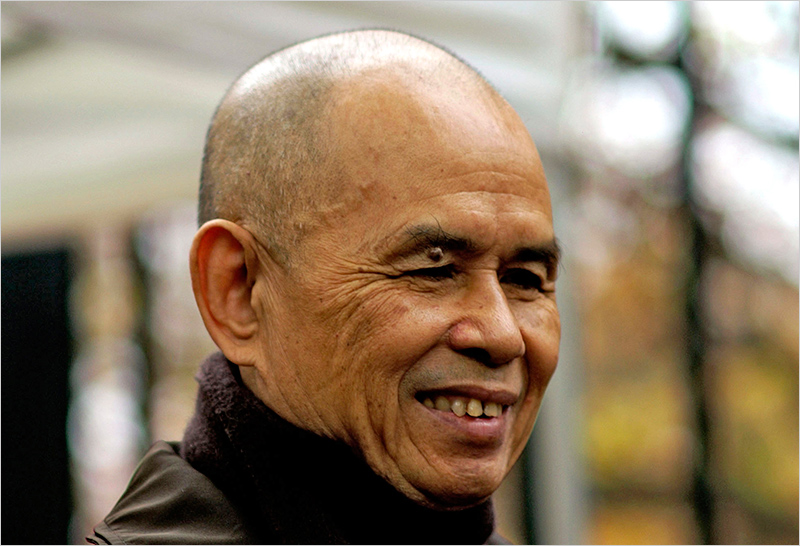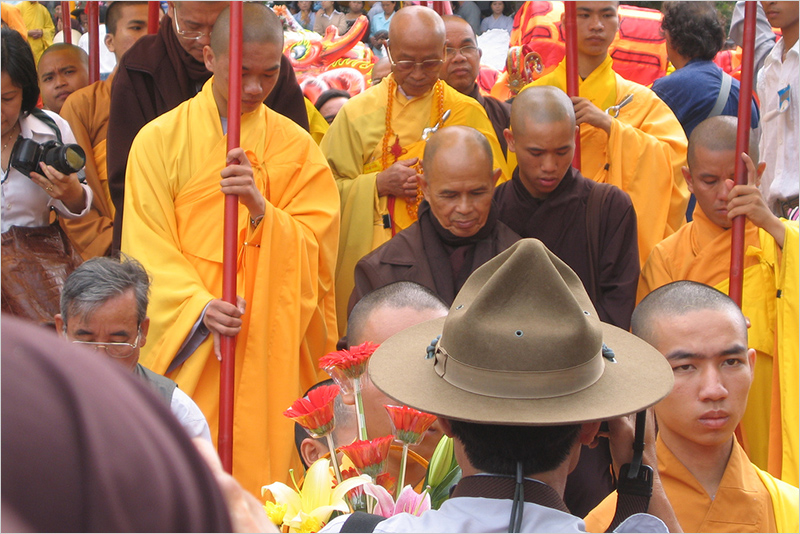As one of the most important figures in the fields of mindfulness, meditation and Zen Buddhism, Thích Nhất Hạnh continues to have a major influence around the world. We share some of the best Thích Nhất Hạnh quotes and take a deeper look at his teachings.
Thích Nhất Hạnh is recognised internationally as one of the most influential figures in the fields of mindfulness, meditation and Zen Buddhism. Having been ordained as a monk in 1949, Nhất Hạnh has since written more than 100 books and has travelled the world, imparting wisdom and sharing his philosophy on life.
Over a period of almost 70 years, Nhất Hạnh built a lasting legacy through his lessons on meditation, self-awareness, understanding, peace, love and non-violent conflict resolution. Thích Nhất Hạnh passed away in 2022 after a long life dedicated to his mission.
Thích Nhất Hạnh quotes: engaged Buddhism
'Engaged Buddhism' is a term coined by Thích Nhất Hạnh, with its first known usage coming in his 1967 book, Vietnam: Lotus in a Sea of Fire. As a philosophy, it was heavily influenced by the Buddhism practised and taught by Master Tai Xu, who was influential in helping to reform Chinese Buddhism.
While Tai Xu advocated what he referred to as human-life Buddhism, Nhất Hạnh developed this philosophy further. Essentially, the 'Engaged Buddhism' he teaches focuses on using the insight gained through meditation and dharma teachings to ease economic, social and political suffering within society.
“When bombs begin to fall on people, you cannot stay in the meditation hall all of the time. Meditation is about the awareness of what is going on — not only in your body and in your feelings, but all around you.” Thích Nhất Hạnh
The Thích Nhất Hạnh quote above actually originates from an interview with Lion's Roar magazine and perfectly captures Nhất Hạnh's core belief in 'Engaged Buddhism', which became especially important to him and his spiritual community in the midst of the Vietnam War, during which they aided those that were experiencing the horrors.

Thích Nhất Hạnh's influence lives on in his quotes and books
Nhất Hạnh saw the help they provided as being part of their mindfulness and meditation practice, rather than something separate from it. What this particular Thích Nhất Hạnh quote demonstrates is the belief that meditation can (and should) extend beyond the self, due to the insight and perspective it provides.
Quotes on: The Enemies of Man
Over the years, Thích Nhất Hạnh has often used his influence and wisdom to stress the importance of recognising the fact that the true 'enemies of man' are ideological, rather than physical. The most famous example of this philosophy being put into words came in the mid 1960s, in a letter written to Martin Luther King.
In it, Nhất Hạnh wrote that the enemies of monks in Vietnam were not man, but "intolerance, fanaticism, dictatorship, cupidity, hatred and discrimination". He also opined that in the civil rights struggle in the US, Martin Luther King's enemies were not specific human beings, but "intolerance, hatred and discrimination".
“When another person makes you suffer, it is because he suffers deeply within himself, and his suffering is spilling over. He does not need punishment; he needs help. That's the message he is sending.” Thích Nhất Hạnh
This Thích Nhất Hạnh quote is an interesting extension of the basic 'Enemies of Man' teaching. Once again, it centres on the idea that we should not see those who do wrong as our enemies, or as people in need to punishment or retribution, but instead as people who can be helped, or who are in need of help.
MORE LIKE THIS:
- The Hearth of Buddhism: the Birthplace of Buddha
- Who is Jon Kabat-Zinn, the Master of Mindfulness?
- Jack Kornfield: Mindfulness Teacher and Author
Throughout the 1960s and 1970s, Nhất Hạnh continued to promote the virtues of non-violence, even in retaliation to violent actions. These words help us to understand the deep-rooted beliefs that made this possible for him.
Quotes on: embracing science
Another key teaching that has come to define Thích Nhất Hạnh's philosophy is his view that traditional Zen Buddhist practices can work in conjunction with science. In particular, he embraced Western psychological research and utilised aspects when teaching Buddhist Psychology at Vạn Hanh Buddhist University and Cornell University.
RELATED: How to Practice Buddhism For Beginners
It's only through embracing science in this way that ancient wisdom can play a meaningful role in the modern world. This concept is explored in several of Nhất Hạnh's published works, including the 1992 book, The Diamond That Cuts Through Illusion and Understanding Our Mind from 2001.
“Aware of the suffering created by intolerance, we are determined not to be bound to any doctrine, theory, or ideology, even Buddhist ones. Buddhist teachings are guiding means to help us learn to develop our understanding and compassion. They are not doctrines to fight, kill, or die for.” Thích Nhất Hạnh
Appearing in his 1987 book entitled Being Peace, this quote from Thích Nhất Hạnh emphasises the extent to which he discourages dogmatic adherence to any particular set of teachings, because such inflexible attitudes inevitably lead to conflict and, ultimately, suffering, rather than happiness, peace and contentment.
Instead, one of Nhất Hạnh's most important philosophies is related to the value of being open to new ideas, being willing to challenge existing ones and being adaptable to new research, evidence and technology. There is, after all, wisdom in letting go of bias and recognising that the concept of 'truth' can be fluid, rather than absolute.

Thích Nhất Hạnh travelled all over the globe, sharing his knowledge
Quotes on: love and infatuation
In more recent years, Thích Nhất Hạnh's teachings have placed an emphasis on the concept of love and on defining precisely what it is. In his 2015 book How to Love, he argues that the ideas of 'love' and 'understanding' are inextricably linked. “Understanding is love's other name,” he writes.
With this as the starting point, Nhất Hạnh is able to de-construct the difference between love and infatuation. Love, he says, is about understanding another person and their suffering. Infatuation, on the other hand, is a distraction from one's own suffering and understanding is replaced with fantasy, illusion and projecting ideas onto someone.
“If our parents didn't love and understand each other, how are we to know what love looks like? The most precious inheritance that parents can give their children is their own happiness.” Thích Nhất Hạnh
Finally, this Thích Nhất Hạnh quote, which also appears in his 2015 book How to Love, neatly sums up one of the most significant conclusions he draws, which is that love is something which can be seen and learned. “If we have happy parents, we have received the richest inheritance of all,” Nhất Hạnh writes.
As Maria Popova points out, this is in-keeping with what psychologists know about the role of 'positivity resonance' in learning how to love. Once again, this quote shows how Thích Nhất Hạnh's traditional Zen Buddhist philosophy can operate in perfect harmony with modern scientific research and reasoning. ●
Images: d nelson - arrival, CC BY 2.0, Duc (pixiduc), CC BY-SA 2.0 and mettabebe - Thich Nhat Hanh at festival in Da Nang, CC BY-SA 2.0
happiness.com | The fine art of being: learn, practise, share
Are you a happiness.com member? Sign up for free now to:
■ enjoy our happiness magazine with practical life tips
■ share and support others in our happiness forum
Gratitude | Acceptance | Altruism




Join the conversation
You are posting as a guest. If you have an account, sign in now to post with your account.
There are no comments to display.